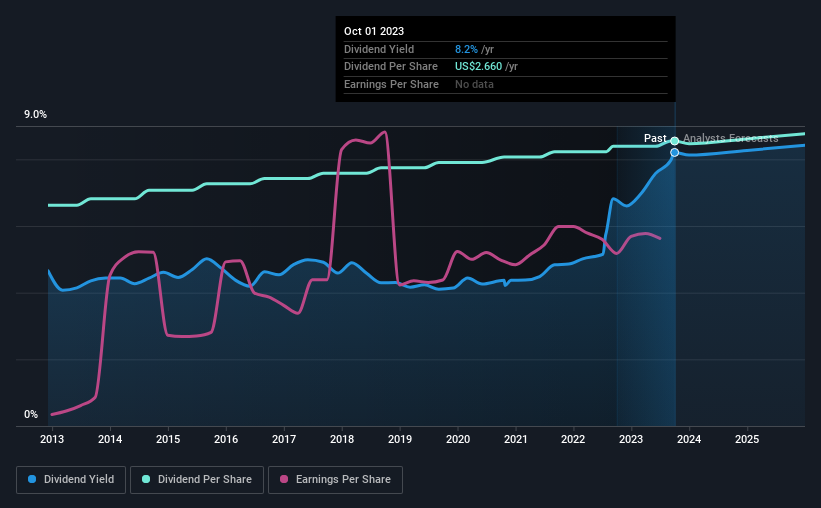Here's Why We're Wary Of Buying Verizon Communications' (NYSE:VZ) For Its Upcoming Dividend
Regular readers will know that we love our dividends at Simply Wall St, which is why it's exciting to see Verizon Communications Inc. (NYSE:VZ) is about to trade ex-dividend in the next four days. Typically, the ex-dividend date is one business day before the record date which is the date on which a company determines the shareholders eligible to receive a dividend. The ex-dividend date is of consequence because whenever a stock is bought or sold, the trade takes at least two business day to settle. In other words, investors can purchase Verizon Communications' shares before the 6th of October in order to be eligible for the dividend, which will be paid on the 1st of November.
The company's next dividend payment will be US$0.67 per share. Last year, in total, the company distributed US$2.61 to shareholders. Looking at the last 12 months of distributions, Verizon Communications has a trailing yield of approximately 8.2% on its current stock price of $32.41. Dividends are an important source of income to many shareholders, but the health of the business is crucial to maintaining those dividends. So we need to check whether the dividend payments are covered, and if earnings are growing.
View our latest analysis for Verizon Communications
Dividends are typically paid from company earnings. If a company pays more in dividends than it earned in profit, then the dividend could be unsustainable. Verizon Communications paid out 52% of its earnings to investors last year, a normal payout level for most businesses. A useful secondary check can be to evaluate whether Verizon Communications generated enough free cash flow to afford its dividend. Over the last year, it paid out more than three-quarters (88%) of its free cash flow generated, which is fairly high and may be starting to limit reinvestment in the business.
It's positive to see that Verizon Communications's dividend is covered by both profits and cash flow, since this is generally a sign that the dividend is sustainable, and a lower payout ratio usually suggests a greater margin of safety before the dividend gets cut.
Click here to see the company's payout ratio, plus analyst estimates of its future dividends.
Have Earnings And Dividends Been Growing?
Companies with falling earnings are riskier for dividend shareholders. If earnings fall far enough, the company could be forced to cut its dividend. With that in mind, we're discomforted by Verizon Communications's 7.5% per annum decline in earnings in the past five years. When earnings per share fall, the maximum amount of dividends that can be paid also falls.
Another key way to measure a company's dividend prospects is by measuring its historical rate of dividend growth. Verizon Communications has delivered 2.6% dividend growth per year on average over the past 10 years. That's interesting, but the combination of a growing dividend despite declining earnings can typically only be achieved by paying out more of the company's profits. This can be valuable for shareholders, but it can't go on forever.
Final Takeaway
From a dividend perspective, should investors buy or avoid Verizon Communications? While earnings per share are shrinking, it's encouraging to see that at least Verizon Communications's dividend appears sustainable, with earnings and cashflow payout ratios that are within reasonable bounds. With the way things are shaping up from a dividend perspective, we'd be inclined to steer clear of Verizon Communications.
With that in mind though, if the poor dividend characteristics of Verizon Communications don't faze you, it's worth being mindful of the risks involved with this business. In terms of investment risks, we've identified 2 warning signs with Verizon Communications and understanding them should be part of your investment process.
A common investing mistake is buying the first interesting stock you see. Here you can find a full list of high-yield dividend stocks.
Have feedback on this article? Concerned about the content? Get in touch with us directly. Alternatively, email editorial-team (at) simplywallst.com.
This article by Simply Wall St is general in nature. We provide commentary based on historical data and analyst forecasts only using an unbiased methodology and our articles are not intended to be financial advice. It does not constitute a recommendation to buy or sell any stock, and does not take account of your objectives, or your financial situation. We aim to bring you long-term focused analysis driven by fundamental data. Note that our analysis may not factor in the latest price-sensitive company announcements or qualitative material. Simply Wall St has no position in any stocks mentioned.

 Yahoo News
Yahoo News 

